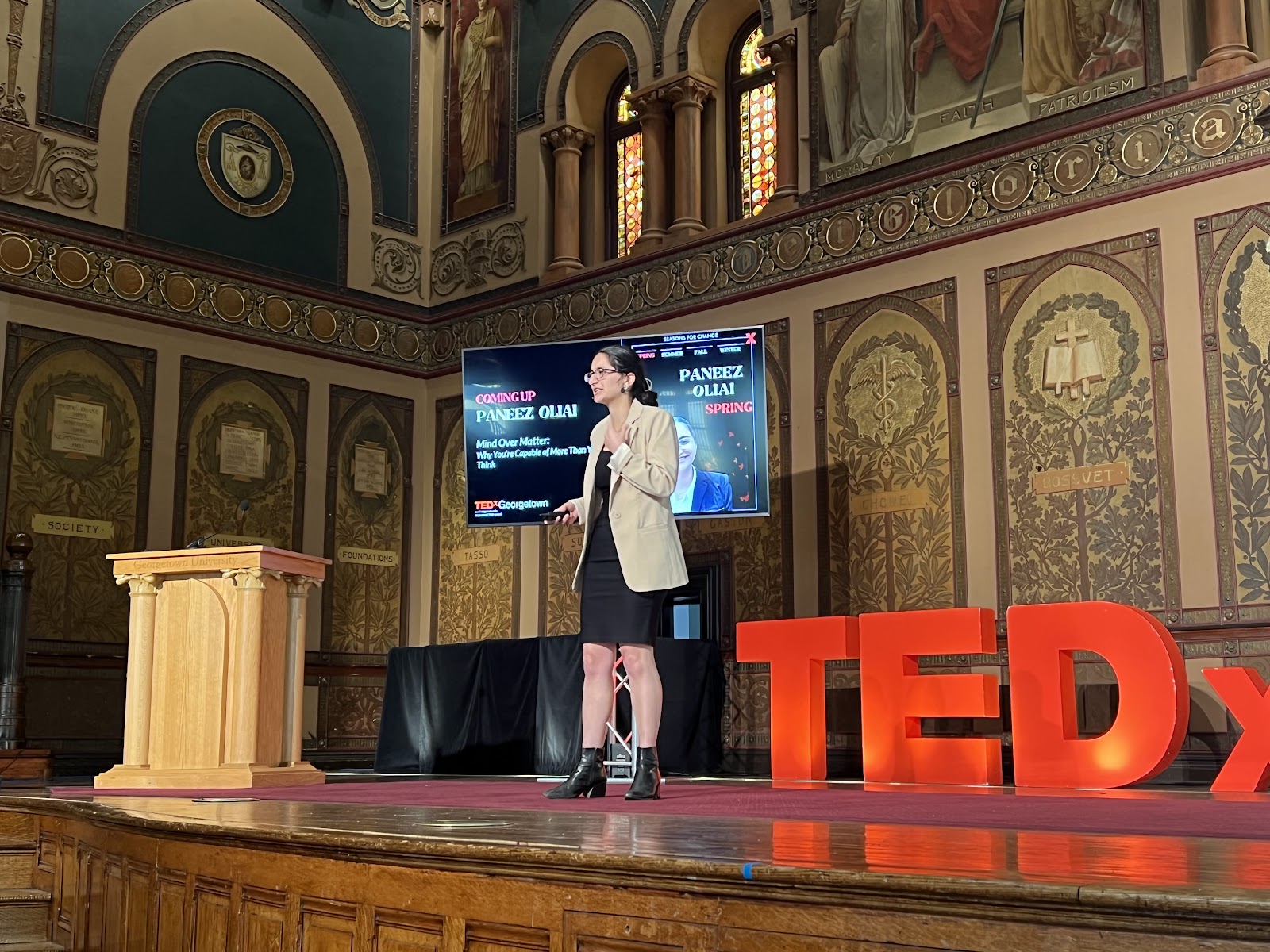Ten speakers chronicled their life experiences and personal growth at the 12th annual TEDxGeorgetown event on April 23. The event’s theme, “Seasons of Change,” guided attendees through four seasons of talks, exploring the motifs of uncertainty, opportunity, renewal, and acceptance in day-to-day life.
TEDxGeorgetown is an independently organized TED event led by Co-Chairs Rithvik Veeramachaneni (CAS ’25) and Anaya Mehta (CAS ’25) along with 15 other board members. The conference hosted five student speakers alongside five external guest speakers, including consultant Kia Afcari, who emphasized the importance of diversity, equity, and inclusion in the workplace, and professional squash player and activist Zahab Khan, who shared her experience as a female athlete in a politically unstable and male-dominated Pakistan.
Paneez Oliari (CAS ’23), the first student speaker, said that when she heard the year’s theme, “Seasons for Change,” she knew exactly what she wanted to talk about.
“I think there’s something so profound and poetic also about the way that we’re considering our lives in terms of seasons,” Oliari said in an interview.
“I think one of the big things personally for me growing up is that, just having been an Iranian-American or just a woman of color in a space that has maybe not always been the most receptive. I grew up being called terrorist on the reg, so it was a difficult way to grow up,” Oliari said. “And in spite of that, being able to do as much as I want to do and as much as I’ve dreamed of doing and remaining optimistic throughout it all, I think represented something to me about pushing through that quote-unquote ‘winter’ of our lives.”
In her talk titled “Mind Over Matter: Why You’re Capable of More Than You Think,” Oliari emphasized the importance of harnessing the power of one’s mind to attain their goals with the psychology concept of “mind over matter.” As a psychology major, Oliari walked students through examples of the connection between the mind and the body, and how one’s expectations and beliefs can result in tangible change.
According to Oliari, the concept of mind over matter works differently than self-help books that often offer shallow or unhelpful advice to those seeking advice by requiring material goods to improve their lives.
“I think the cool thing about mind over matter is that it is self-sustainable. It is everything. You have everything that you need within yourself and that’s the beauty of it,” she said. “Whatever you think is possible, go further than that.”
Another speaker who focused on her experience as a woman was Anna Kutbay (LAW ’26). Her talk, “What My Late-In-Life Autism Diagnosis Taught Me About Change,” centered on adapting to change through the lens of such a diagnosis.
“A lot of us go through changes in our life that we don’t know how to handle, or that we don’t know what it means for our future,” Kutbay said. “And I focused specifically on women with autism, especially those diagnosed late in life, because that change can be pretty intense.”
Kutbay felt that her call for hope and acceptance of change fit perfectly with the theme of fall; while the season’s arrival heralds chilly nights and dying leaves, summer can only return after the cold months have passed.
“I hope anybody who feels they are struggling or knows someone who is struggling with maybe undiagnosed autism realizes that a diagnosis doesn’t have to be life ending. It’s a big change, but it’s also not taboo or something that they should be afraid of. It’s something they should embrace and encourage others to seek out and embrace,” Kutbay said. She believes that the benefits of accommodations and understanding oneself better far outweigh the fear from seeking a diagnosis.
“Yes, change is hard. But it’s necessary for transition,” Kutbay added.
Umayr Shaikh (MED ’26), took advantage of the year’s theme to tell a story he’s been trying to tell for many years: the importance of studying the humanities as a medical student. In his talk titled “So, You Want to Be a Doctor? Study English!” Shaikh shared his holistic approach to medicine, speaking to both pre-med students and humanities students.
“I’ve always been a big believer in the philosophy of being a generalist in the specialist world,” Shaikh said. “If you know how to do a lot of things and you can integrate them across disciplines and apply what you’ve learned in one area to another, I think that’s the greatest intellectual gift someone can have—so fully explore what you’re passionate about and look for as many ways to use it as you can.”
Shaikh hopes that an integrative, cross-disciplinary approach to medical learning and practice can help transform the health sector.
“It feels like we’re almost changing seasons,” Shaikh said. “COVID caused massive catastrophe upon the world, and now that we’re out of it, we’re looking for ways to remodel and reform the medical system. And that’s a big change. And it’s not always going to be easy.”
Marissa Nissley (CAS ’24), the founder of the “Legally Blonde & Blind” podcast, chronicled her life from childhood to student at Georgetown to new owner of a guide dog, a yellow Labrador named Smalls, in her talk “Miss Interdependent: How a Guide Changed my Perspective on Disability and Independence.”
“It was a massive change I had went through this year,” Nissley said. “I’d only gotten her and it was a huge shift in terms of lifestyle and how I was traveling. So it felt like a really fitting time for me to do a TED talk and to reflect on those changes and think about how working with Smalls has led to this huge shift in my view of disability and independence.”
In reflecting on her journey, Nissley’s talk emphasized the importance of recognizing that asking for help isn’t a weakness.
“I was talking a lot about how there’s this huge emphasis on self-reliance and independence, and those are positive traits, but when taken to an extreme they can have devastating consequences and lead you into a position like mine, where you aren’t willing to ask for help or acknowledge your limitations,” Nissley said. “There’s so much beauty in interdependence.”
Anisa Nanavati (SFS ’26), the last speaker, reflected on recent defining moments in her life and recalled crying on a dorm floor surrounded by friends, which inspired her TED talk.
“I was like, ‘I’m going to turn this moment of sadness into something that can be a lesson that people learn from, and also just put a more positive spin on the entire experience for me,’” Nanavati said.
Nanavati, the self-proclaimed “therapist friend” of her friend group, echoed many of the other speakers when she admitted that she’s always wanted to do a TED talk.
“A year ago my mom even sent me a text saying, ‘Anisa, I think you should do a TED Talk,’ and once I saw the opportunity, I was like, ‘I might as well just give it a shot,’” Nanavati said. “I feel like I have something important to say.”
Nanavati’s hope for her words to have an impact did not go unfulfilled. She shared that a woman approached her at the official mixer following TEDxGeorgetown and said that she had filmed Nanavati’s whole talk to share with her teenage daughter. According to Nanavati, her message is especially important for Georgetown students struggling under pressure.
“I really hope that people just let themselves be human and let themselves grieve and cry and just let their feelings out,” Nanavati said. “I feel like a lot of people bottle their emotions and just wait until they have a massive breakdown to fully address it. I just hope that people take more time to take care of themselves. Especially at Georgetown.”




